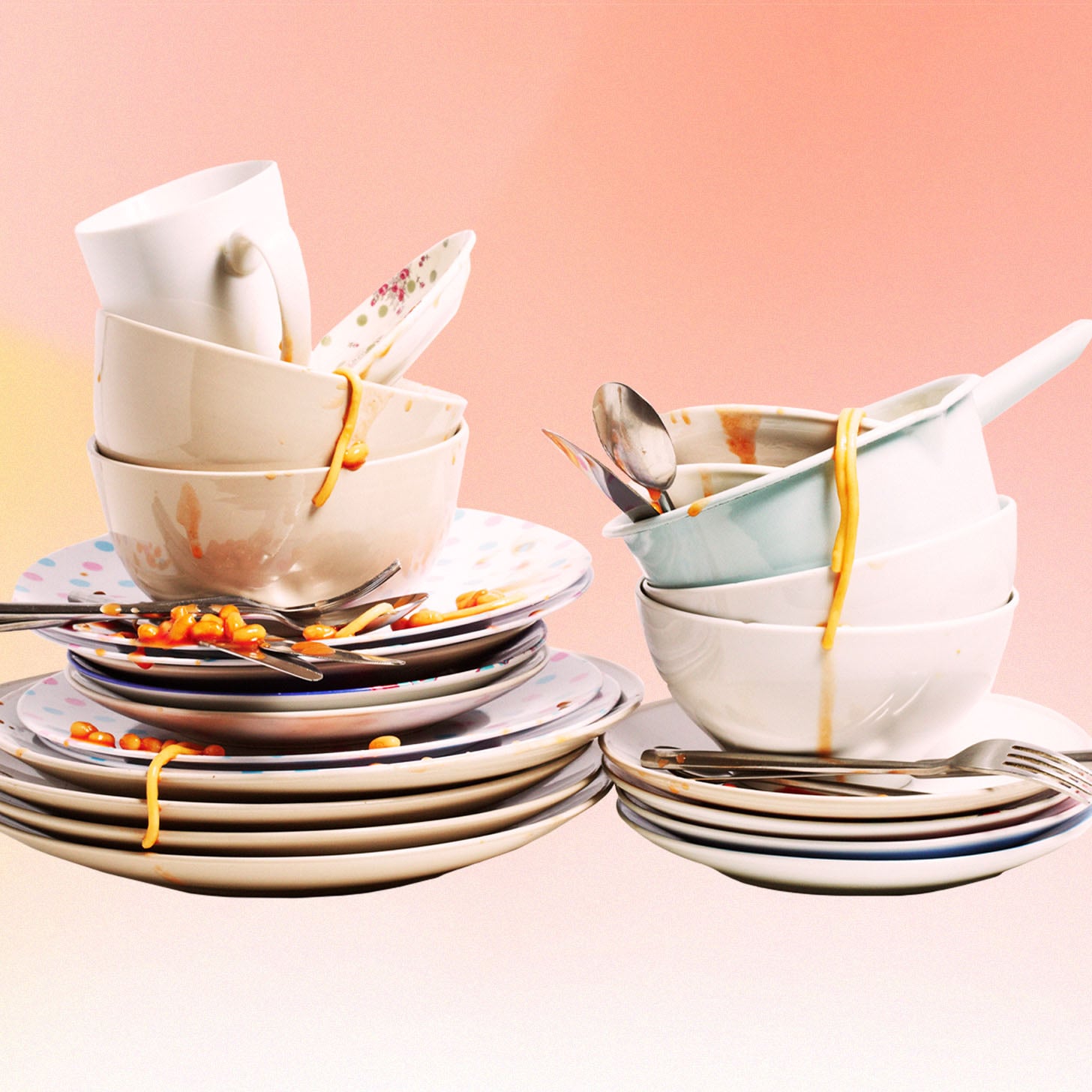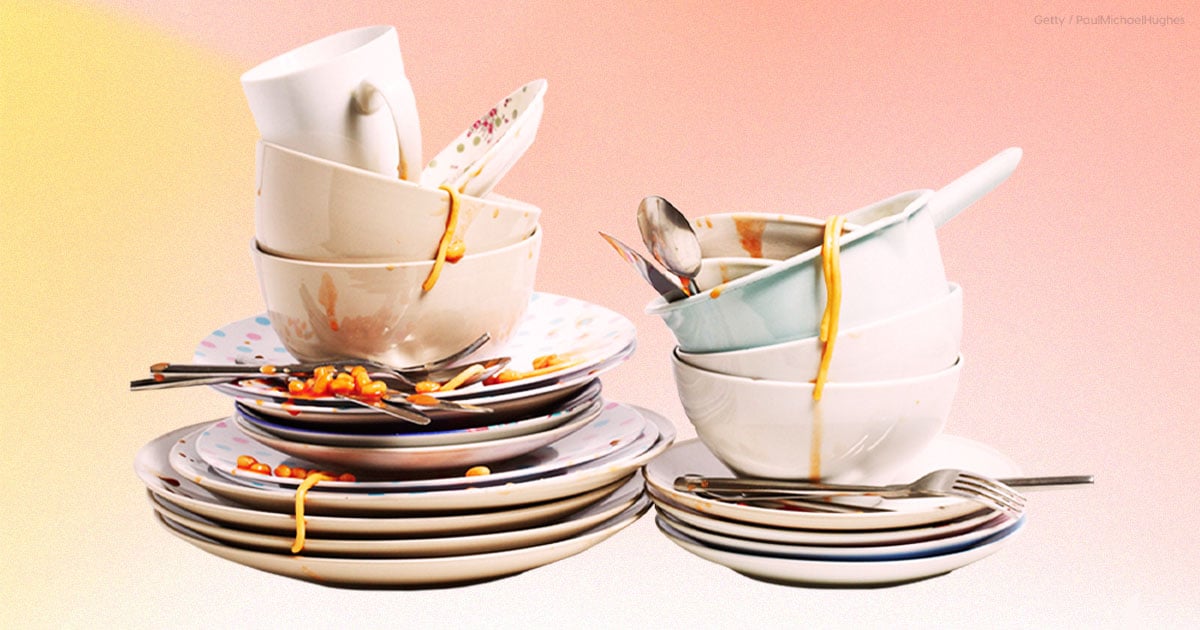
There they are again. The gross, crusty, five-day-old dishes sit piled up amid the confines of my small, stainless-steel sink. They’re making their presence known, clashing against the gleam of my very clean and crumb-free countertop. The tepid pile of plates, bowls, and cups, all stuck together, look like a gross Jenga tower. It seems the dirty dishes, again, have sprung up out of nowhere.
I hate doing the dishes. But ironically, I clean all the time. I look forward to organizing my closets and excavating cat hair from the corners of my house. It calms me down. I play music, and my wife and I fall into an easy, unspoken pattern of “I do this, you do that” harmony. This is true for everything except the dishes.
I’m lucky enough to be with someone who not only cooks but also cooks very well. My wife treats me to hot lunches, curated snack plates, and elaborate, varied dinners. So it seems only fair that I do the dishes. Except most times, I don’t. I clean everything but the dishes. I just pile them into the sink with a weak promise of “tomorrow morning?,” and when my wife offers to help me the next day, I am fierce. Almost tiger-like in my protectiveness of the dishes. “No, they are mine. Don’t touch!”
It’s not that I always turn down help, it just feels unfair that my wife should shoulder more chores to my benefit. This pattern could go on for days until I finally felt guilty enough to actually do them.
The reason dishes are so hard for me is summed up perfectly in The Atlantic’s “Doing Dishes Is the Worst” article by Caroline Kitchner. She says it’s a task that “requires getting up close and personal with somebody else’s daily grime,” and I couldn’t relate more. For me, it’s seeing the remains of a once-glorious meal reduced to gross textures, pruny fingers, and bacteria cultures that makes me so averse to touching. It’s a selective disgust spurred on by a combination of sensory issues and a sense of mounting nihilism — they will just get dirty again, won’t they?
But recently, I hit a breaking point when my wife woke up early one morning to tackle the pile I’d been hoarding, and I knew I had to change.
Even though we don’t necessarily fight about housework, domestic tension over the dishes isn’t anything new. A report from the Council on Contemporary Families (CCF) studied how gender, relationship satisfaction, and chore distribution affected relationships. Perhaps unsurprisingly, the report found that relationship satisfaction, sexual intimacy, and the rate of conflict were tied deeply to a fair distribution of chores between men and women. But among all household tasks, dishwashing was the most consequential to relationship quality for heterosexual women. Coincidentally, more than 77 percent of women reported doing the majority of dishes themselves.
Now, as lesbians, my wife and I have had no qualms about the gendered dynamics of nesting together. In our home, all work is women’s work: repairs, bills, groceries, cooking, plumbing, renovations, cooking, and, yes, dishes. But the study did illuminate just how important dishes are, perhaps more than any other task.
About three months ago, I realized how much I was allowing myself and my loved ones to be inconvenienced by this. Dirty dishes are visible and inconvenient in a way many other chores aren’t. If your pan is dirty, you can’t use it. If your favorite coffee cup is out of commission, compromises must be made. So I made a deal with myself. It was a resolution of sorts, made in the middle of a burning-hot Florida summer.
I’m not normally a resolutions person. I find they’re mostly guided by guilt and self-hatred — like, I’d never join a gym in January, because you can just feel people punishing themselves via cardio. So I set a few ground rules to avoid feeling punitive toward my own impulses. First, I didn’t have to finish the dishes after a meal, but I did have to start them. (Once I started them, I knew I was likely to finish them. And if I didn’t, I’d at least make a dent.) Second, if I went to bed having skipped the dishes, I’d tackle them in the morning before coffee or work. Third, if my wife asked me to do the dishes, or offered to do them herself, I would handle them right then and there. I wanted to do my fair share of the housekeeping, rather than shift the burden to my wife.
Surprisingly, I’ve actually stuck to this. And over time, I’ve become less motivated by guilt and more compelled by the satisfaction of performing a service to my family and home. When I ask my wife how she feels about the change, she says simply, “It’s great when I can use the sink.” In fact, as I’m sitting down to write this, there is a single cup and one lonely spoon in the sink. Life is good.
So take it from me: when it comes to improving your quality of life, it’s easy to want to take on the biggest task possible — to reinvent yourself, get your dream job, or transform your relationships. But often, meaningful change comes from something as small as doing the dishes.
Image Source: Getty / PaulMichaelHughes
